In life, we all have the tendency to believe that we are unworthy on some deep, undefinable level. Whether we believe that we are unworthy of happiness, pleasure, love, or fulfillment, we all have a “core wound” deep inside that varies according to our circumstances and experiences.
This deep, fundamental wound is the result of the foundational beliefs that we were taught since birth, contributing to the faulty self-image that we continue to carry around with us to this very day.
Our core wounds are our deepest seated pains in life. They are our oldest and most miserable friends.
For most of us, these core wounds within us are ruled by the following two mistaken beliefs:
1. “I am flawed and therefore a bad person.”
2. “I must change or fix something about myself in order to be acceptable.”
Read Toxic Shame: How Internalized Shame Alters Our Self-Image
The Original Sin (aka. How We Became Wounded)
Christian teachings make reference to our “core wound” all the time in the form of “original sin.” However, once we put aside the dogmatic associations connected with this notion, we see that “original sin” reveals something profound about our deep-rooted core wounds; how issues such as generational guilt, self-rejection, imbalanced self-esteem, and self-hatred have passed on from generation to generation.
Often, our core wounds start in childhood.
When we are little we are free, however, at some point during our childhood, we began to experience constraints. As we “ate from the Tree of Knowledge” (aka. grew and evolved as human beings) we slowly came up against invalidation and rejection from our parents, elders, and peers.
We began to experience disapproval and punishment for being our authentic selves; for having unique feelings, thoughts, outlooks, interests, and needs. And so, our core wounds began.
As our core wounds began to deepen throughout our childhoods, pubescent years, and subsequent adult years, we began to put up barriers of protection to keep other people from hurting us. Although in many cases this protected us, in the end, it served to trap us inside, limiting our ability to experience true freedom and authenticity in our day-to-day lives and in every one of our relationships.
Our core wounds are the cause of most of the fatigue we experience in daily life, preventing us from accessing the huge stores of untapped energy, and potential within us.
They are also what makes solitude so refreshing as they give us a momentary respite from the lies we tell ourselves and others to protect our deep, unhealed gashes.
12 Signs You Have An Unhealed Core Wound
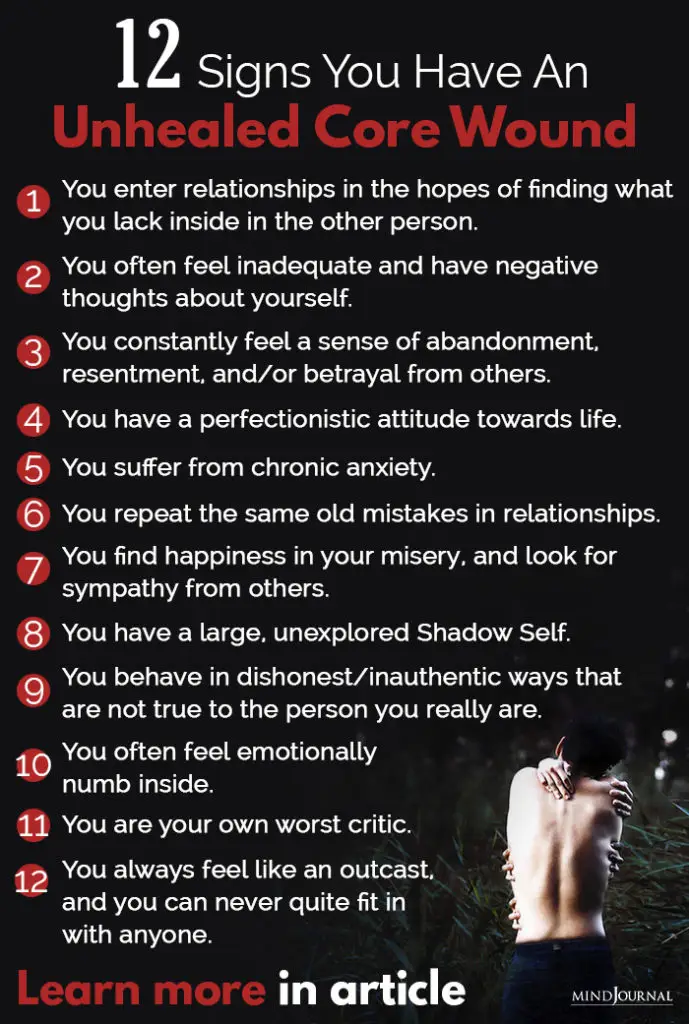
Everyone experiences their core wound differently. Depending on your Soul Age, level of emotional sensitivity, and the level of rejection you faced while growing up, your core wound could be an irritating scab or a festering laceration.
How is your core wound manifesting itself in your life? Read the signs below:
1. You enter relationships in the hopes of finding what you lack inside in the other person (i.e., you want to “feel complete”).
Read How To Heal Your Most Debilitating Core Wounds
2. You often feel inadequate, and you often have the following thoughts: “I am not enough,” “I am incomplete,” “I am unlovable,” “I don’t count,” “I am imperfect,” “I am powerless,” and “I am bad.”
3. You constantly feel a sense of abandonment, resentment, and/or betrayal from others.
4. You have a perfectionistic attitude towards life (i.e., you gain your self-esteem from the outcome of your actions instead of the intention behind your actions).
5. You suffer from chronic anxiety. This comes as a result of anticipating the emotional pain of being found unworthy, which deep down you think is true.
6. You repeat the same old mistakes in relationships. This is because you are trapped in a habitual mindset and don’t feel courageous enough to make a change.
7. You find happiness in your misery because it’s a source of attention in the form of sympathy from other people.
8. You have a large, unexplored Shadow Self.
9. You behave in dishonest/inauthentic ways that are not true to the person you really are. You behave in this way to gain the acceptance of others.
10. You often feel emotionally numb inside. You feel a sense of meaninglessness and disconnection from the world around you. This is the ultimate defense mechanism: feeling nothing.
11. You are your own worst critic (i.e., you constantly remind yourself how much of a “loser” or a “failure” you are).
12. You always feel like an outcast, and you can never quite fit in with anyone. Instead of appreciating your uniqueness and seeing it as an opportunity, you see it as a curse.
The larger your core wound is, the more you experience Soul Loss. Often, this is passed onto the people around you (like a virus) – especially children, who are the most susceptible and vulnerable of all.
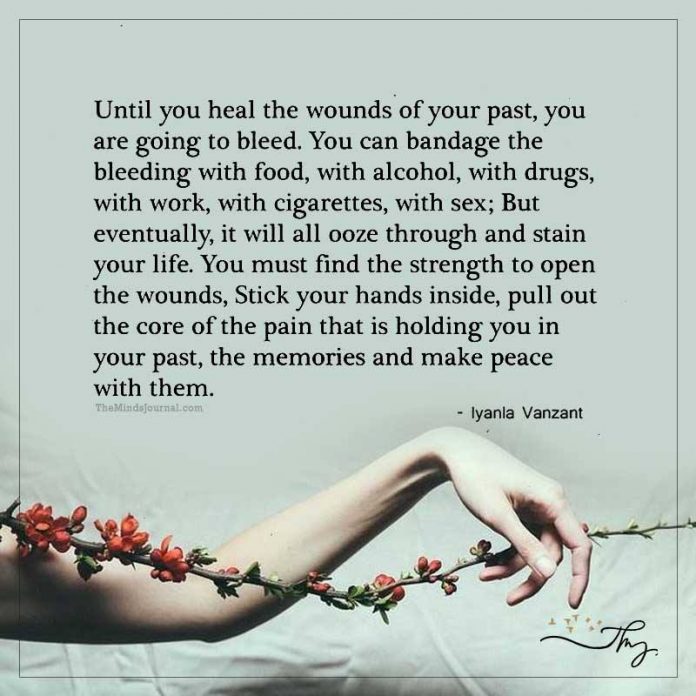
List of Core Wounds
Core wounds are many and varied. Here’s a list of core wounds and the accompanying core beliefs that can grow from them:
1. Abandonment (“There’s something wrong with me,” “I’m unlovable,” “I am unimportant”).
2. Betrayal (“I am unworthy,” “I am hopeless,” “I am a failure”).
3. Physical/Sexual/Mental/Emotional abuse (“I am ugly,” “I deserve only bad things,” “I’m not in control,” “I am weak,” “I am always unsafe,” “I deserve to be punished”).
4. Rejection (“I am shameful,” “I am a bad person,” “I don’t deserve love,” “I have to be perfect,” “I will never belong”).
This is not an exhaustive list, but it highlights the most common emotional core wounds that people struggle with. How many can you relate to?
Read 25 Signs You Have a Wounded Inner Child and How to Heal
How to Find Your Core Wound?
The most suffering we experience from our core wounds revolves around the false self-images we present to the world. On one hand, we go through life pretending to be very important, and on the other, we believe that we are unworthy, ugly, unlovable, or broken deep down.
We need to examine our wounds carefully, wash them using psychological and spiritual tools (e.g., shadow work), and keep them clean until they heal. A good place to begin this process is by being honest with ourselves. We need to stop avoiding the truth about how we authentically feel and develop the courage to face our wounds and erroneous perceptions.
A greater Master once said, “you will know the truth, and the truth will set you free.” Only once you truly become aware of your core wound, of how you inherited your “original sin” and the idea that you’re “unworthy,” will you be able to find closure. Only by forgiving what keeps you from experiencing wholeness deep down can you become free.
With that being said, here are some powerful ways of uncovering your core wound. Most of them surround asking the question “why?”:
1. Use Your Feelings as an Anchor.
One powerful way of uncovering your core wound is by using any negative emotion you feel in the moment as an anchor to draw you down inside of yourself. You can then examine what you are feeling when it began, and why you feel the way you do.
For example, if I was feeling great frustration in the present moment, I could use that feeling as a trigger to ask myself, “Why?” I might then like to mentally trace back the development of that feeling and discover that the feeling of frustration is a by-product of deep sadness I feel. Then I could examine that deep sadness. Why do I feel that way? I might discover that this deep sadness comes as a result of feeling as though I had failed to get to work on time. Then I could examine why getting to work late makes me feel so bad. I might then discover that I feel like a failure, and thus uncover a core belief/wound:
Unworthiness (“I am a failure”).
This technique can be applied to countless feelings and after a while, you might find a pattern emerging that will allow you to discover the main thread of your core wound.
2. Somatic/Bodily Mindfulness.
Not everyone is able to become aware of what they are emotionally feeling in the present moment, which is where somatic mindfulness comes in handy.
Somatic mindfulness is basically the practice of stopping throughout the day and scanning your body for tension and illness. You might like to create alerts on your phone or work calendar to remind you, or you might simply like to stop and assess your body whenever you feel discomfort.
For example, if I felt my heart pounding and my hands sweating in the presence of other people I might like to examine this feeling in the present moment, or later after the feeling has left. I might discover that my pounding heart and sweating hands were a result of my nervousness around others. I might go deeper and ask why I feel that way and discover that I’m scared of what other people think of me. Still, I might go deeper and ask why I am so scared of what they think and discover one (or all) of the following core beliefs:
“I am stupid”
“I am unacceptable”
“I am embarrassing/shameful”
Somatic mindfulness is best practiced after learning how to completely relax your body, perhaps in a nightly bath of warm water, or through a daily relaxation practice such as mindfulness or meditation. Otherwise, if your body is constantly tense, you will find it difficult to be conscious of the physical changes that occur throughout the day.
Read How Mindfulness Can Improve Your Overall Mental Health
3. Solitude and Introspection.
This final technique is simple to do and only requires making time to be alone each day.
Ideally, the easiest practice during this solitary time is to keep a daily journal where you record your thoughts and feelings. This is a useful practice for visual and auditory learners as you can make use of the mechanisms of introspective writing, illustrating, and brainstorming.
For example, you might like to write in your journal:
My friend made me feel sad, angry, and insecure without knowing it today when she said that “I should dedicate more time to myself.”
Then you might like to explore this feeling in the following way directed by the main question “Why?“:
“I should dedicate more time to myself” –> (why?) –> makes me feel embarrassed –> (why?) –> makes me feel ashamed –> (why?) –> makes me feel pathetic –> (why?) –> makes me feel unworthy = This statement from my friend reminded me of how poorly I feel about myself, that “I am unworthy” and that “I don’t deserve to be happy.”
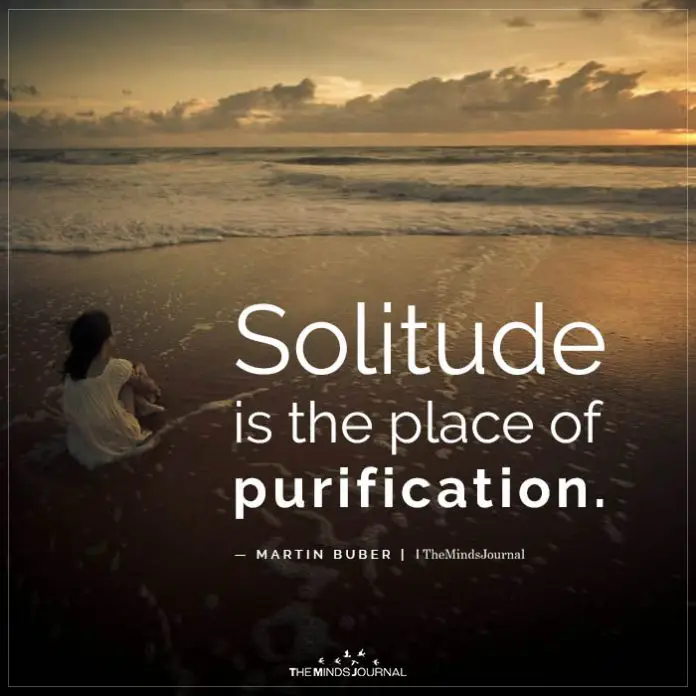
There’s an endless array of ways to dissect and dig to the depths of how you feel during solitude and introspection. For example, other methods you could use include Venn diagrams, thought pyramids, dialogue with your inner parts (or archetypes), or simply writing freely until your thoughts begin to flow and reveal interesting discoveries.
I hope these techniques help you to discover your core wounds. Remember that simply uncovering your core wound isn’t the end of the journey. You’ll need to replace these core wounds with the practices of self-love. The more self-love you develop, the more these inner wounds will heal and be transformed. Read our ultimate guide on how to love yourself more in order to keep moving forward on this healing journey.
What do you think your core wound might be? How do you think it has shaped you? What is the major lesson you can learn from it? I’d love to hear below!
Written by Mateo Sol Originally appeared on Loner Wolf
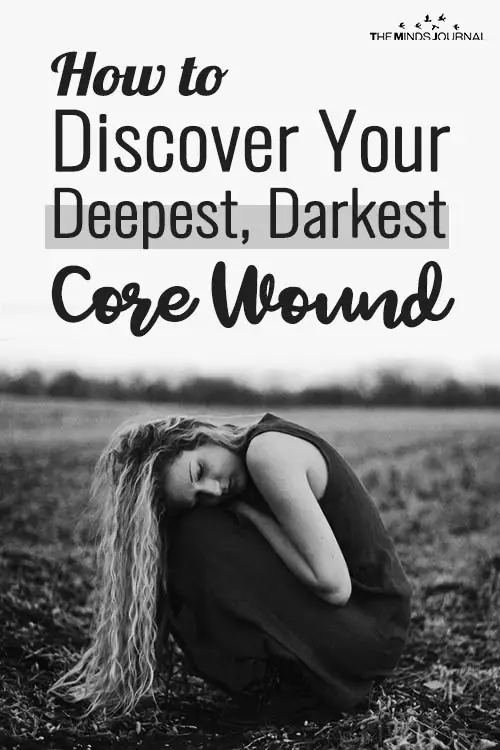
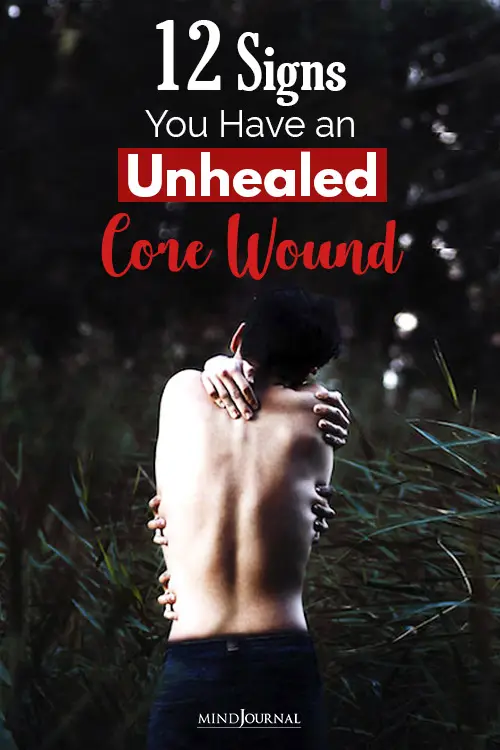
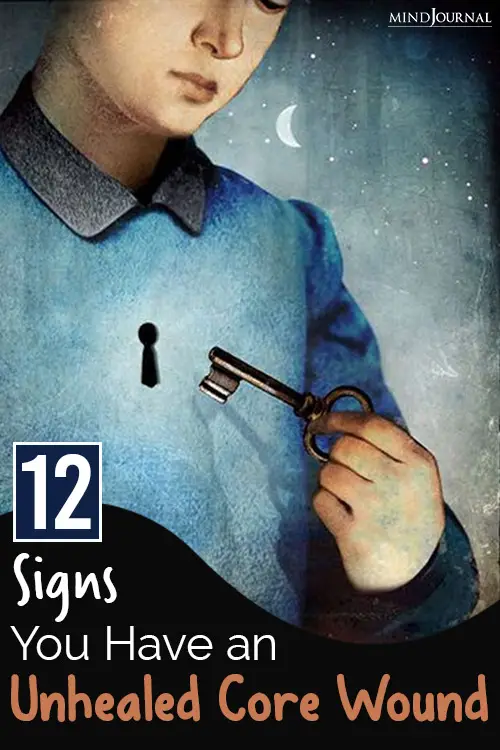
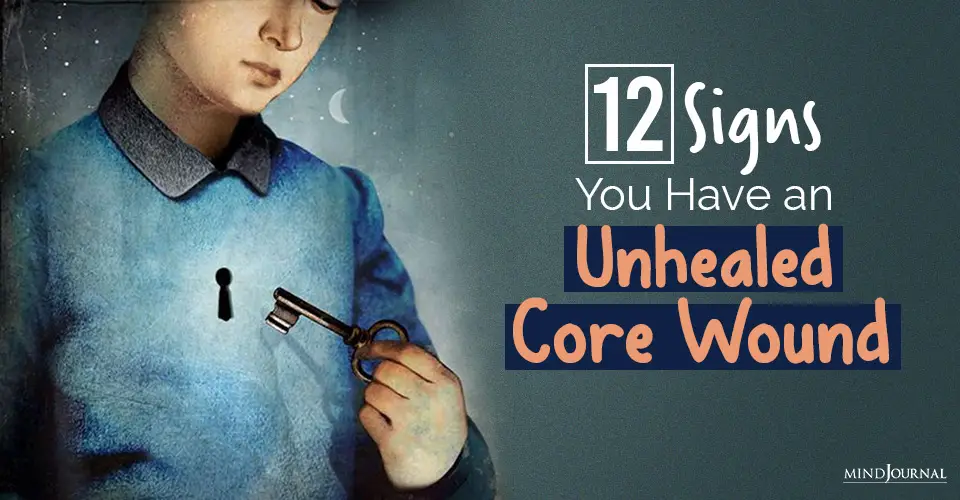







Leave a Reply
You must be logged in to post a comment.